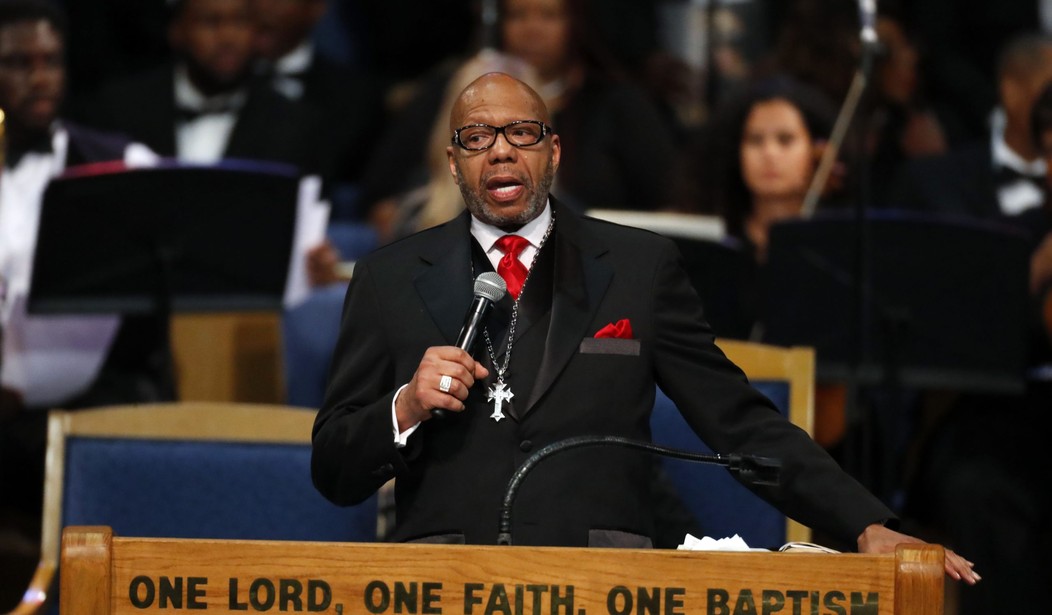The Rev. Jasper Williams Jr. isn’t backing away from the eulogy — which included criticism of Black Lives Matter — he delivered at the funeral of legendary singer Aretha Franklin, even though Franklin’s family branded his speech “offensive and distasteful.”
Vaughn Franklin, one of Aretha Franklin’s nephews, said he was speaking for the Franklin family when he told the Detroit Free Press Rev. Williams “spent more than 50 minutes speaking and at no time did he properly eulogize her.”
“We feel that Rev. Jasper Williams, Jr. used this platform to push his negative agenda, which as a family, we do not agree with,” Vaughn Franklin also said in the statement.
Williams, 76, who also said black America was “losing its soul,” told the Associated Press the sermon was appropriate for the singer’s funeral. The Atlanta pastor also argued the timing for his comments couldn’t have been better given all the other speakers at the funeral who criticized President Trump.
There were some cheers from the audience when Williams said, ”Where is your soul, black man? There are no fathers in the home no more,” and spoke to the need for greater responsibility from men in the black community.
But, some in the audience also seemed bothered by Williams preaching that “as proud, beautiful and fine as our black women are, one thing a black woman cannot do, a black woman cannot raise a black boy to be a man.”
He also said that it was as good as “abortion after birth” to try to raise a child in a single-parent household.
Aretha Franklin was the mother of four boys, the first two born when she was a teenager.
And the Free Press reported groans could be heard from the audience when Williams said, “Black lives will not matter until black people start respecting black lives and stop killing ourselves.”
While not mentioning the Black Lives Matter movement by name, Williams complained that the black community is more than ready to protest “when the police kills one of us,” but fails to address black-on-black violence.
“We’re ready to loot, steal whatever we want,” Williams said. “(But) when we kill 100 of us, nobody says anything, nobody does anything. Black on black crime, we’re all doing time, we’re locked up in our mind, there’s got to be a better way, we must stop this today.”
Several on social media responded to Williams’ eulogy, which was broadcast live, by calling it a “disaster.” Tariq Nasheed, a filmmaker and writer who describes himself as “an anti-racism strategist,” tweeted, “Reverend Jasper Williams plantation style speech is a prime example of why there is a total disconnect between young Black people and the older Black church crowd.”
“All that cowardly ‘you’s gots to do better’ talk ain’t fooling these kids,” Nasheed added.
A’ Ja Lyve, an Iowa State alum, wife and mother, tweeted that Rev. Williams was ”a homophobic, sexist, misogynist, ableist, uneducated bigot.”
And Bill Madden, a singer, songwriter and self-described “fierce paladin for social justice,” used his 140 characters to wonder on Twitter, “Who invited this Trump-loving, misogynistic motherf*cker from a bygone era?”
“We need to make love great again because black lives do matter,” Stevie Wonder told the audience after Williams finished, “because all lives do matter.”
The Rev. Wendell Anthony, the pastor of Fellowship Chapel in Detroit and president of the Detroit NAACP, said Williams’ comments criticizing the African-American community and culture were not new. Anthony pointed out well-known black Americans, like Bill Cosby, have spoken on those issues for years.
However, Anthony also said Williams failed to put the problems within the black community into the proper context by not addressing social and economic conditions plaguing African-Americans.
“Part of the issue yesterday was the need to elaborate and to put a holistic approach to certain points he was making,” Anthony said. “The area of black-on-black crime is one in particular. That issue has been a source of much discussion in our community.”
But not all of Anthony’s peers were as charitable or forgiving.
The Rev. Otis Moss III, the pastor of the United Church of Christ in Chicago, wrote on his Facebook page that Aretha Franklin’s funeral was “at key moments difficult to stomach.”
“As I watched today my heart soared and then was crushed by the cruel, patriarchal, respectability politics offered as a Eulogy,” he wrote. “I read one comment from an activist I deeply respect his statement read ‘ this is the reason I ran from church and have not been back in forever.’”
Williams, who also eulogized Aretha Franklin’s father, the Rev. C. L. Franklin, in 1984, told the Atlanta Journal-Constitution that he knew his comments were controversial and wasn’t surprised by the reaction.
“When you’re criticized as much as I’ve been, you don’t let it get to you,” said Williams. “I know where my heart and head are, and I’m willing to explain and talk about it. I saw what was happening in Black America today that is really leading us to lose our soul.”
“Dr. (Martin Luther) King brought us through the wilderness,” Williams also said, “but we haven’t taken ourselves to the promised land.”









Join the conversation as a VIP Member